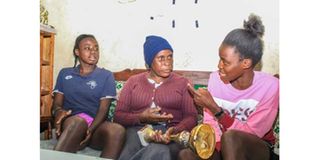Grandmother, a child’s empathising caregiver

Kenya's top seed Angela Okutoyi with her grandmother Mary Ndonga and sister (right) Roselinda Asumwa at their home on Loreto Convent Valley Road on February 6, 2021.
What you need to know:
- Findings suggest naturally determined gender differences.
- Their energy to the offspring is an exercise in ensuring the preservation and perpetuation of her genes.
Have you ever noticed the automatic affinity children have with their grandmothers even when meeting for the first time? According to a recent scientific study, this is due to the latter being naturally predisposed to care for the former.
Titled The neural correlates of grand-maternal caregiving by James Killing, Amber Gonzalez and Minwoo Lee of Emory University, the study, which was published in the Royal Society B journal on November 16, 2021, scanned neural images of 50 women who were shown pictures of their grandchildren aged three to 12. The scans revealed a strong emotional correspondence between the two.
According to Prof Killing, “what really jumps out is the activation in areas of the brain associated with emotional empathy”, suggesting that “grandmothers are geared towards feeling what their grandchildren feel when they interact with them.” Contrastingly, when the grandmothers viewed images of adult children, their brains were engaged in rationally deciphering what the latter thought or felt but without much emotional engagement.
The study noted that similar motor-related sections of the brain lit up in mothers and were thought to stimulate the instinct to pick up the child. A previous study by Prof Killing noted that when fathers looked at pictures of their children, the activation of the emotional processing areas was generally weaker than that of grandmothers.
Instincts
These findings suggest naturally determined gender differences that should inspire other studies on behaviours that appear instinctual to men or women, such as promiscuity and dependency.
This study somewhat advances the grandmother hypothesis that the redirection of grandmother’s energy to the offspring is an exercise in ensuring the preservation and perpetuation of her genes. This is itself rooted in the evolutionary theory that women invest more heavily than men in the offspring because they can only produce a limited number of children due to inter-birth interval.
Beyond establishing the emotional grandmother-grandchild bond, this study takes us back to traditional society that we are fast losing, or have obliterated in some cases.
In the Luo traditional cosmos, for example, the grandmother was the pillar of girls’ socialisation. It is in her hut that pubescent girls slept and were tutored on sexuality. She knew each girl in her stable and could vouch for their characters. She instilled group discipline and superintended girls on how to manoeuvre romance without intercourse and pregnancy. Thus, a deviant girl who failed the test was lampooned as “one who never slept in siwindhe (grandmother’s hut)”.
In a similar fashion, the Baule of Cote d’Ivoire have a saying that “your grandmother has taught you this and you want to ask your mother”. This is to mean the granny knows better.
Reincarnation beliefs
The grandchild-grandparent bond in many African communities is etched in naming systems and beliefs about reincarnation. Among the Agikuyu, for instance, it is mandatory that the first born son take the name of the paternal grandfather while the first daughter assume that of the father’s mother. Patriarchal as it is, this system recognises the inter-generational bond.
In many cases, grandchildren are expected to replicate the characters of those the grandparents they are named after. The Emory University study seems to validate this affinity that traditions already recognised.
Studies show that the grandmother is a labour valve for daughters and daughters-in-law who can live behind their children with her to take up productive activities in the comfort that the offspring are in the safest of hands. This is highlighted by Christina Egerstrom citing a study by the University of New South Wales. In some African communities, the grandmother is actually brought into the son’s home when the wife gives birth, to care for the newborn and the mother.
In Kenya, it is documented that the responsibility of caring for children orphaned by HIV/Aids and brought forth by teenage schoolgirls falls squarely on grandmothers. Needless to say, grandmothers are also custodians of indigenous knowledge on nutrition, herbal medicine, weather, sexual and reproductive health, folklore, religion and the lot.
Communal life
Regrettably, we have lost the communal village life that created a proximity for grandchildren to constantly interact with their grandmothers, thanks to the physical and social distances imposed by modernisation, westernisation and urbanisation. The results are evident in the decadent moral fabric manifest in sexual permissiveness and endemic teenage pregnancy with its attendant consequences.
This is not to idolise grandmothers. As research shows, some are embodiments of evil and perpetrators of harmful practices such as infanticide, femicide and female genital mutilation. By and large, however, grandmothers, as an asset, are rarely celebrated. Maybe, we can start by integrally involving them in development planning and education. As well, a reading of the anthology ‘Grandmother’ by American-Indian Ray Young Bear may help us relive their love.
Dr Okumba Miruka is an international gender and development consultant and scholar.





